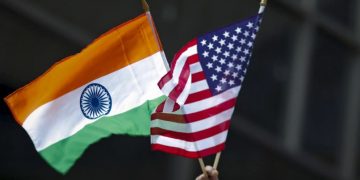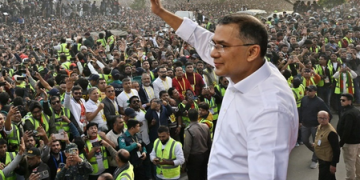“We’re just going to kill people that are bringing drugs into our country,” US President Donald Trump recently told reporters in the White House. His administration had already begun to do just that, using air strikes in the Caribbean Sea and the eastern Pacific Ocean to destroy suspected drug-smuggling vessels and kill those on board – at least 64 people so far. With Trump now threatening to conduct similar operations on land, the contours of a violent new US foreign-policy doctrine are becoming sharper. This new doctrine carries echoes of the one President James Monroe articulated in 1823, which held that the US would regard any foreign intervention in the Americas – specifically, European colonialism in Latin America – as a hostile act. In 1905, President Theodore Roosevelt expanded on this idea with his “corollary to the Monroe Doctrine,” which stated that the US had a “responsibility to preserve order and protect life and property” in the countries of the Western Hemisphere. Lest this sound benevolent, it is worth recalling Roosevelt’s 1904 assertion that the US, as a “civilised nation”, may be “forced” to exercise “international police power” in response to chronic unrest or “wrongdoing” in Latin American countries. In other words, the US would decide what behaviour was acceptable in sovereign countries in its “sphere of interest” – and was entirely justified in punishing whoever did not comply.
The parallels with Trump’s approach are obvious. On top of the recent air strikes, which have often taken place near Venezuelan waters, Trump’s administration has renewed accusations that Venezuelan President Nicolás Maduro’s government constitutes a “narco-terror cartel.” Add to that a US military buildup in the Caribbean – including warships, surveillance planes, fighter jets, and troops – and it seems that the US is not seeking simply to disrupt the drug trade; it is eyeing regime change.
But there are key differences between the Monroe Doctrine and Trump’s approach. For starters, whatever “moral duty” the Monroe Doctrine claimed to reflect has been replaced by a more overtly coercive, ego-driven logic. Thus, the Panama Canal is a strategic hub that the US is “taking back.” Mexico does what the US administration “tells it to do.” Brazil is to be punished with a 50% tariff for prosecuting former President Jair Bolsonaro for his Trump-inspired attempt to overturn his 2022 election defeat. And Canada, which should become the 51st US state, is similarly punished with a suspension of trade talks over a television ad airing in Ontario that used audio of President Ronald Reagan criticising tariffs.
Meanwhile, Trump has authorised a bailout package worth up to $40 billion for Argentina, in order to give a boost to his ideological ally, President Javier Milei – a deal that US Treasury Secretary Scott Bessent has referred to as central to a new “economic Monroe Doctrine.” Expressions of gratitude and admiration from Milei – who just secured a decisive victory in midterm elections – feed Trump’s ego and reaffirm US leadership in the region, while highlighting the erosion of Latin American countries’ autonomy.
Such actions reflect Trump’s perception of intra-American relations as fundamentally hierarchical, with a country’s position in the pecking order being determined by the benefits – and obedience – it offers to the dominant US. Whereas previous US presidents tried to reconcile Woodrow Wilson’s idealism with Roosevelt’s realism, Trump merges both impulses into a single, volatile creed: exceptionalism without responsibility or restraint.
Another critical difference is that Trump’s approach is shaped by domestic populism. Just as he purports to be rooting out the “enemy within” – from deploying the National Guard in US cities to waging lawfare against perceived foes like former FBI Director James Comey – he claims to be protecting the US from the “enemy” on its doorstep. By bending the Western Hemisphere to his will, Trump hopes not only to assert dominance over the outside world but also to reinforce his authority at home. The Trump administration’s call on the US military to embrace a “warrior ethos,” and its decision to call the Department of Defence the Department of War (the pre-1947 name) serve similar ends.
The implications extend well beyond Latin America. For Trump, meeting with Chinese President Xi Jinping amounts to engagement between rivals seeking balance, but to a transaction between masters of their respective domains. This helps to explain why Trump views China’s inclusion of Latin America in its Belt and Road Initiative and its presence in Cuba and Panama as provocations.
China, hardly keen to respect Trump-imposed boundaries on its “sphere of influence,” continues to expand its footprint, from Pacific maritime routes to African infrastructure. But, in many ways, Xi’s “dual-circulation” strategy, which aims to balance self-reliance with selective openness, is a mirror image of Trump’s insular assertiveness. In fact, when it comes to foreign policy, Trump and Xi differ more in style than in substance. Both reject the old multilateral order and favour power over process. Decades of institutional efforts to subordinate force to rules are now unravelling.
This emerging world is not bipolar in the rigid Cold War sense. Rather, it has two gravitational centres, orbited by middle powers – such as Brazil, India, Indonesia, and the Gulf states – which have no interest in being dragged into either sphere of influence. Whether these countries manage to cooperate could decide whether the 21st century degenerates into a sort of feudal system, where might makes right, or evolves into a more pluralistic order constrained by rules.
This transformation poses a daunting challenge for Europe. It’s ally now views the rule of law as an obstacle to be trampled, and security commitments as leverage to be wielded to advance its own goals. But rather than lament this shift, Europe must adapt, investing in defence, deepening partnerships beyond the Atlantic, and working with those in the “periphery” that share its commitment to a rules-based international order.
The writer is a former foreign minister of Spain and a former senior vice president of the World Bank Group






































